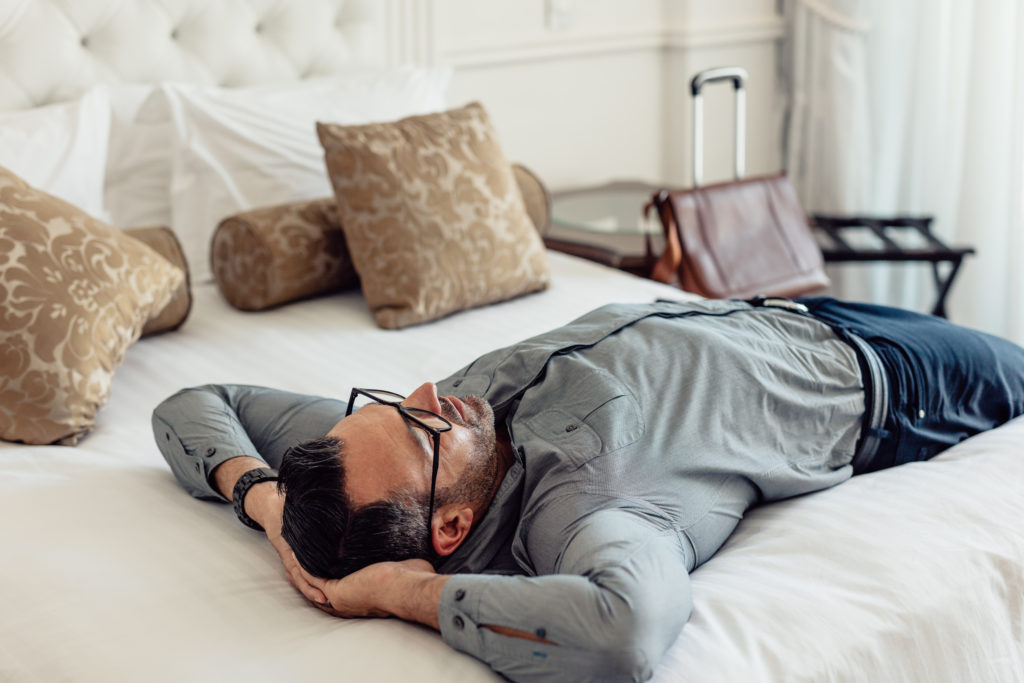
Articles
The Secret to a Happy Holiday: Create a Plan to Reduce Stress and Improve Sleep
There’s a reason you’re seeing more stories about the ways holiday stress impacts your health. While stress about COVID-19 has…
Introducing SleepScore
We deliver accurate data, actionable insights, personalized coaching and proven outcomes your customers need.
Sleep Insights
Last Published on 6th June 2025 by SleepScore Labs

Resting, recharging, and rejuvenating—who doesn’t love vacation? Not only does it signal that you’ll finally escape from the demands of work and get some quality self-care time, but it can also be the opportunity you need to get some much-needed sleep.
Contrary to the idea that you’ll be slipping into blissful Zzzs while away, getting quality sleep while on vacation doesn’t come as easy as you may expect. But fear not! With just a few adjustments and tips, you can keep your sleep on track while you’re vacationing just about anywhere.
Whether you’ll be spending your vacation in your city, in another town, or four time zones away from home, certain factors may cause you to have sleep troubles. Some of the major ones are:
The first night in a new location often leads to restless sleep—a phenomenon known as the first-night effect. Research shows that one hemisphere of your brain remains more alert than the other when sleeping in an unfamiliar environment, acting as a “night watch” to monitor for potential threats (Tamaki et al., 2024).
So, if you plan to spend your vacation away from home, you are prone to experiencing the first-night effect.
Vacations are a dream. But many cannot say the same about preparing for a trip and traveling to your destination. These activities may cause so much physical and mental stress that your body starts to experience travel fatigue when you get to your destination.
Travel fatigue, a physiological and psychological stressor, can arise regardless of how many time zones you cross. It’s often caused by the chaos of preparation, long travel times, and the transition itself. A 2025 study found elevated blood pressure and poor first-night sleep following both short and long trips (ScienceDaily, 2025).
A study investigating whether humans experience travel-related stress responses found that the participants’ blood pressure increased the day before and the day after travel. They also experienced poor sleep on the first night in their new location.
Jet lag occurs when your internal clock is out of sync with the local time of your travel destination. It’s typically experienced after crossing three or more time zones and can lead to daytime sleepiness, GI discomfort, and reduced focus.
New findings confirm that while sleep duration may recover within days, sleep quality and timing can take over a week to normalize (Uchida et al., 2025).
Celebrations, travel, and festive indulgences can all take a toll on your sleep during any holiday season. Whether it’s a special occasion, long weekend, or extended vacation, shifts in your routine—like staying up late, eating rich meals, or drinking more alcohol—can interfere with your natural sleep-wake cycle.
Here are practical, research-backed strategies to help you maintain quality sleep while you travel:
Plan ahead to avoid last-minute stress. Create a checklist in the weeks leading up to your trip and tackle a few items each day. The better you sleep the night before travel, the more rested you’ll feel when you arrive.
Stick to your usual bedtime routine—like reading, meditation, or a warm shower—to help signal to your brain that it’s time to sleep. Maintaining this ritual and rhythm supports your circadian alignment, especially when adjusting to new time zones (Sleep Foundation, 2024).
Recreate a familiar sleep space: keep the room cool, dark, and quiet. Bring sleep accessories like your own pillow, a white noise machine, or an eye mask to help your body feel at ease in a new place (Sleep Health Network, 2024).
Physical activity helps recalibrate your internal clock. Morning exercise can anchor your body’s alert phase, helping with both time zone adaptation and sleep quality (Sleep Foundation, 2024).
Light is a natural regulator of your circadian rhythm. Morning sunlight can help you feel more awake and shift your body clock toward the local time (Sleep Foundation, 2024).
Both substances can disrupt your ability to fall and stay asleep. Alcohol can reduce REM sleep and increase awakenings, while caffeine can linger in your system for up to 6 hours, delaying sleep onset (Sleep Foundation, 2024).
Avoid screens two to three hours before bedtime. Blue light from phones and laptops suppresses melatonin, making it harder to fall asleep—even more so in a new environment (Sleep Foundation, 2024).
Warm summer nights can make it even more challenging to fall and stay asleep while traveling. Experts recommend maintaining bedroom temperatures between 66–68°F for optimal rest. Use fans, breathable sheets, and blackout curtains to reduce heat and light disruption (Health, 2024).
Additionally, dehydration and late-night heavy meals are more common during summer vacations and can interfere with digestion and deep sleep. Prioritize light, hydrating meals and limit alcohol late in the evening (Statesman, 2024).
Better sleep doesn’t have to take a vacation—especially when you have the right tools. The free SleepScore App helps you stay on top of your sleep health no matter where your travels take you. Using patented sonar technology (no wearables required), the app tracks your nightly sleep patterns and provides you with a personalized SleepScore each morning.
Whether you’re adjusting to a new time zone, dealing with summer heat, or trying to recover from travel fatigue, the SleepScore App delivers personalized, science-backed advice to help you sleep your best. It also includes bedtime reminders, insights into how your habits affect sleep, and access to curated sleep solutions through the SleepScore Store.
Getting great sleep while on vacation is achievable when you do your best to follow these practices. And it’ll make your vacation even more enjoyable as a result!
Download the free SleepScore App on the App Store or Google Play and take better sleep with you—wherever you go.
Sleep Well & Enjoy Your Vacation!
Sources